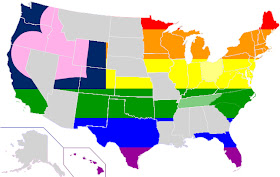On August 22 for SCOTUSblog Lyle Denniston wrote an in-depth article on divining the will of the Supreme Court in regards to certain types of same-sex marriage:
Since
early this year, the Supreme Court has stepped back into the same-sex marriage
controversy five times. While it has done little to explain those
actions, it has sent some signals about its thinking. Its most important
signals may have been those it appeared to have sent Wednesday, in putting
off the issuance of marriage licenses to same-sex couples in Virginia.
Between
the nine lines of that order, the Court implied that
it will not be rushed into a decision about which, if any, cases it is going to
review. And it left no doubt that the Justices themselves, not the
lawyers or their clients, are in charge of the timing. The Court, in
short, has not yet gotten caught up in the race to settle the basic
constitutional issue just as soon as it could possibly do so.
Just as a refresher, the Supreme Court upheld the stay for the 4th Circuit and the 10th Circuit, but has allowed marriage to proceed in Pennsylvania and Oregon based on the logic put forward in Hollingworth.On the face it does appear to be a bit of a mix signal. The article goes on to say:
The
Court had been urged, by all sides in the Virginia case, to speed up the
process of finding a case for review by turning a simple request for delay into
an actual, formal petition — a move that could have cut short several
procedural steps, and set up the Virginia case as a prime candidate for review.
The
Court silently refused the suggestion, simply delaying things in Virginia until
after a county clerk actually files a petition for review, in the usual form
and on the usual timetable. That was a clear sign that the Court was
doing its best to act as if it were business as usual, even on this hot
constitutional controversy.
Obviously it would be nice if the Supreme Court would speed up the process, yet it is the Supreme Court. Perhaps the entire circumstance can best be summed by the sentence, "That was a clear sign that the Court was doing its best to act as if it were business as usual, even on this hot constitutional controversy."
Is a
grant of review a certainty in coming months? There is never a
sufficiently strong advance signal to predict that.
In a weird way this article tells us everything and nothing. I do not find it unusual for the the Supreme Court to resist from being pushed into doing anything. And as for giving signals, the Supreme Court is notoriously leak-proof.
There are two issues that emerge after reading the article: will the court even take up the issue and its significance; and why is there such a sense of urgency around this issue.
After reading the article, it is apparent that certiorari is not guaranteed. Due to the massive number of federal cases that have moved in the last year, it is tempting to say the Supreme Court will act; even though as Mr. Denniston has pointed out, marriage equality is a "hot constitutional controversy."
Though it is unlikely, what would it mean if the Court were to deny certiorari? The practical effect is that all the jurisdiction where marriage equality has been acted on by a court, but where a stay is in place, same-sex marriage will be legal. So if certiorari were denied tomorrow, the map would look like the following:
86.4% of American would live in a state with marriage equality.
Denial of certiorari would probably be the greatest failing of the Robert's Court. It has been 47 years since Loving v. Virginia and now is the time. I mean for fuck-sake, Felons in prison have a constitutional right for 26 years when the Court granted it in Turner v. Safley, 482 U.S. 78 (1987). Felons before gays... felons, you know the people who can't vote because the have done bad things, people segregated from the rest of the population and locked away because they have done terrible things. They can get married. So, yah, if they don't act fuck 'em.
Addressing the second question, the urgency of the issue comes from the opposing sides, each with their own motivations. The marriage opponents want the Supreme Court to put a quick end to the spread of marriage equality. The longer lower courts are able to issue pro-equality rulings, the more jurisdictions will issue pro-equality rulings.
For the marriage supporters, it is an issue of cruel fact that every minute of life counts. According to the CDC in 2011 In the US there were 2515458 deaths. Based on the controversially low CDC figure, 1.6% of the population is gay. Currently 43.5% of the US population lives in a state where same-sex marriage is currently available (places where gays can walk on down to the county clerk and actually get married.)
Therefore, around 62 gay people die each day unable to get married, or around 22,740 per year.
This year, two prominent women in the equality movement died. In March, Vernita Gray, who married Pat Ewert in Illinois, unfortunately passed away. While earlier this month, Fredia Hurdle, who was among the Plaintiffs in the Pennsylvania case, passed away unexpectedly before she could marry her partner of 24 years. My morbid point is that everyday for a large number of Americans, our rights come too late.
Liam '14


No comments:
Post a Comment